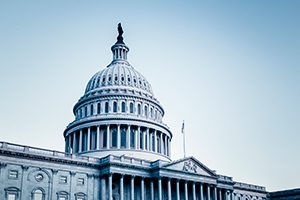House Passes the Pregnant Workers Fairness Act
 Updated 5/17/21
Updated 5/17/21
On May 14, the House of Representatives voted (315-101) to pass H.R. 1065, the Pregnant Workers Fairness Act, which will require employers to make reasonable accommodations for qualified employees affected by pregnancy, childbirth or related medical conditions.
The bill, which had amassed 228 cosponsors in the House (208 Democrats and 20 Republicans) ahead of today’s vote, also has broad support from civil rights groups, worker advocates, religious organizations and the employer community — including the support of CUPA-HR which joined a letter with other employer organizations urging Congress to pass the bill.
Introduced on February 15 by Rep. Jerry Nadler (D-NY), the bill specifically declares that it is an unlawful employment practice for employers to do any of the following:
- fail to make reasonable accommodations to known limitations of such employees unless the accommodation would impose an undue hardship on an entity’s business operation;
- require a qualified employee affected by such condition to accept an accommodation other than any reasonable accommodation arrived at through an interactive process;
- deny employment opportunities based on the need of the entity to make such reasonable accommodations to a qualified employee;
- require such employees to take paid or unpaid leave if another reasonable accommodation can be provided; or
- take adverse action in terms, conditions or privileges of employment against a qualified employee requesting or using such reasonable accommodations.
The bill also sets forth enforcement procedures and remedies for different types of employees. As an example, for employees and employers covered by Title VII of the Civil Rights Act of 1964, the procedures and remedies will mirror those of that law, including the powers vested in the Equal Employment Opportunity Commission (EEOC). The EEOC is therefore directed under this bill to provide examples of reasonable accommodations for affected employees that should be provided unless the employer can demonstrate that such accommodations would impose an undue hardship.
What’s Next?
Now that the bill has passed the House, it will head to the Senate, where a companion bill, S.1486, has already been introduced by a group of six bipartisan senators. It is likely that Senate Majority Leader Chuck Schumer (D-NY) will take up the bill for a Senate floor vote, though it is unknown if there is enough Republican support to overcome the 60-vote filibuster. In the 116th Congress, the bill passed the House with a strong bipartisan vote (329-73), but the Senate never took up the bill before the session ended, so it is difficult to tell how the Senate vote will turn out this time.
CUPA-HR will track this bill’s progress through the legislative process and keep members updated on its status.


